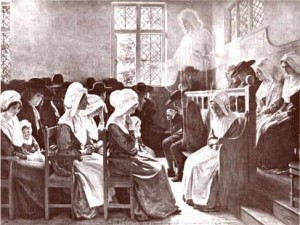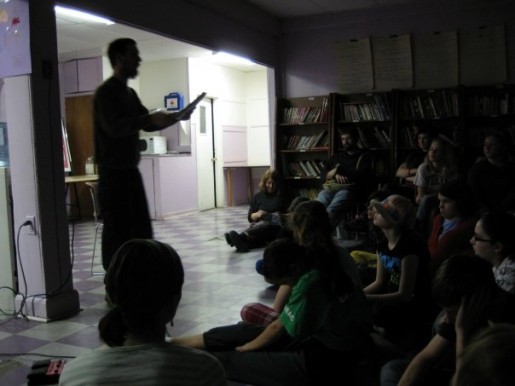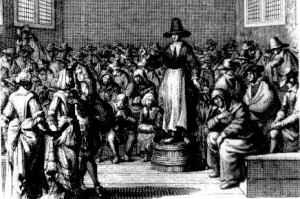Jon Watts
Quaker Songwriter & Video Maker
About
Blog
News
Music
Videos
Contact
What is a Quaker Ministry? (What Isn’t?)
For the past 5 years, I have been writing songs about Quakers, blogging about Quakerism, making videos about Quakers, vlogging about Quakerism, and traveling amongst Friends, sharing my music and my thoughts.
Now I have arrived at a turning point. The original call that I felt to commit to music was for five years. I knew that I would then stand back and re-evaluate, ask the hard questions, and change course if I felt called to.

I have decided to do this re-evaluation publicly, posting a “state of the art” report on my website and asking the query: “How can Jon Watts continue to be of service, considering his natural gifts and passions?”
…and, considering the current state of the art, “How can he be financially supported in this work?”
I have received more messages than I could have imagined, most of them encouraging me to continue, helping me to brainstorm financing, and affirming the value of my work.
I have also received a few messages of discouragement in my continuing along this path. These concerns seem to focus on my use of the word ministry.
And while I continue to be in private dialogue with these particular Friends about my continued use of this word, I thought that it was also worth exploring publicly.
What is “Ministry”?
Quakers believe that everyone has access to that of God within them. This is why we worship in silent waiting on 1st day mornings, and why we do not have hierarchical structures managing our corporate decisions. Our goal is to allow God to lead our congregation, and to decide our business. We can each be a channel for the voice of the Spirit, if we listen and humble ourselves.

Thus our congregation is traditionally not led by a single minister on 1st day mornings, but instead we wait until God selects the minister. Who will stand up this Sunday and be filled with the Spirit’s message? We don’t pretend to know.
Many of us, as Quakers, have the experience at one time or other of being selected to be the vessel for the Spirit in a worship setting. We often find that we have human resistance, human obstacles to overcome in order to faithfully deliver the message that has been given us.
It is a labor of love, for when we are faithful to the message we have been given, we are clothed in righteousness. Friends can be stirred, uncomfortable, hurt, liberated, and can have any number of other responses to our ministry, but when we know that the message has truly come from the Spirit, we can trust that God has a plan for healing transformation, and we can know that it might not look like we would expect it to.
This is a seriously valuable tool that Quakers have cultivated for inward transformation and for cultural transformation. Deep listening. Getting low. Opening one’s heart and ears to messages of Truth from unexpected sources.
What is “Entertainment”?
I have been recording and releasing my own music since I was a Senior in high school (that was 2001 for those of you keeping score). After self-releasing 4 albums of my own music and organizing a handful of shows featuring my songwriting, I stood back and looked at myself as an artist.
Who was I writing songs for?
Who was benefiting from my efforts?
Who was my biggest fan?
The answers, as I examined each of these questions, were all “me”.
It was seriously uncomfortable to examine myself in this way, but also somewhat liberating: I found that I was building myself up with, hiding behind, and providing myself validation with… my music. My pursuing music was fundamentally self serving.
And I was not unique. We live in a culture of celebrity. In place of our actual deity, we raise up deities out of our midst and worship them on our magazine covers. We fundamentally believe that they are better, more deserving, worth our studying them.
 Those of us with a void in our chest where self-love is supposed to be can tend to see this as an opportunity. If I could just raise myself up to be deified, then I could feel loved, valuable, OK.
Those of us with a void in our chest where self-love is supposed to be can tend to see this as an opportunity. If I could just raise myself up to be deified, then I could feel loved, valuable, OK.In the age of the internet, it is getting easier and easier to see who falls into this category. Who is desperately calling for our attention? Who is trying to raise themselves up to a higher status by making themselves into a celebrity? We are correct to be dubious of anyone who seems to be acting from this motivation.
And it doesn’t take an enlightened person to realize that the “celebrity-solution” is a myth. Just read an interview with someone who has attained celebrity. Look behind the veil of their public presentation to the true state of their lives, their relationships.
What we learn is that the self-love void cannot be filled by anything external. It is un-salvable, infinitely able to consume external validation and transform it into self-doubt. The self-doubter might be able to fill their void briefly by attaining celebrity, but it will come back. And it will be hungrier.
I know I labeled this section “what is entertainment” and then talked about the state of entertainers, but this truly is the price of our sitting back and passively expecting to be entertained: self-obsessed ego monsters, living on a pedestal and consuming our attention to feed their insatiable egos. A mad cycle.
We call it “self-serving”, but really this kind of behavior serves no one. Only destruction. The unraveling.
Drawing a Line
But what does this all mean for me? Does rejecting our culture of celebrify-ing artists mean that I should reject an artistic path altogether?

Any endeavor that does not serve a community is an empty endeavor. But could my music be a service?
(Could celebrity, for that matter? This is maybe another blog post)
In 2006 I turned to the model of Quaker ministry to inform my making music. Getting low. Being humble. Only writing songs that felt like a message from the Spirit. Knowing that the message is not my own. Attempting to be a vessel. Releasing my agenda, knowing that my own perspective is severely limited. Letting go and letting God.
(It is worth mentioning that these are very difficult practices, especially with the culture all around pressuring us to frame everything with the self at the center. I don’t claim to be perfect or even consistently successful in my experimenting with holding these practices as a musician.)
I picked up my music again after I was made low in this way. The first album I recorded was solely meant to be of service: exploring stories of Early Quakers and putting them to song. Inviting other Quakers to come into the studio and play on the album. Listening to the Spirit, being held accountable by a support committee.
And indeed, it was anything but an empty endeavor. It was powerful. We were all broken apart, remade. Including myself as artist. Especially myself as artist. Our faith was deepened.
But when I went out into the world to share this Spirit-given ministry with the wider world of Friends, I immediately ran into a wall of feedback: I was told, “Open your eyes more, be more engaging and less prayerful”. In other words, “Entertain us!”
Oh! What paradox!
“Giving Ministry” VS “Having a Ministry”
Quakers have long held a common practice of recognizing Friends amongst us with a clear call to ministry. Often these would be the Friends in our Meetings who would speak often, or who would speak passionately, or most faithfully.
Recognizing a ministry means coming together as a community to acknowledge one Friend’s particular gifts, recognizing their potential service to the congregation (possibly to the wider body), coming together to help cultivate their faithfulness in using their gifts, to support them and to hold them accountable to the Spirit.

Over the years, that practice of recognizing ministers amongst us solidified into a list of criteria for Friends Ministers.
A Friends minister travels with an elder.
A Friends minister is rooted in a Monthly Meeting.
A Friends minister travels under a temporary “concern”.
A Friends minister travels with a traveling minute from their home Meeting.
Etcetera
The only way that I know all of this, though, is because I’ve studied history.
Most modern liberal Quaker Meetings have no practice of recognizing ministers. No practice of supporting ministers, cultivating faithfulness in their use of their gifts, no practice of publicly acknowledging the gift of ministry, no practice of writing or receiving traveling minutes.
“The Burden of Vision”
Those modern Friends who have felt a call to ministry therefore have a difficult choice in front of them:
Go out into the world on their own, lacking the structures of support and accountability.
-or-
Wrestle with their home Meeting, putting off their call to ministry until such time as their congregation comes together to re-claim the tools of recognizing ministers. This is a process that can happen over the course of years or not at all.

To ask a Friend with a call to ministry to first teach their home Meeting how to recognize ministers… this is a difficult thing to ask of a budding minister. I have seen more than a few calls to ministry ignored or burned up in this process of wrestling with the lack of tools in home communities.
I want to take a moment to honor those Friends who have faithfully and patiently waited or laid down a call to ministry as their Meeting discussed (or didn’t discuss!) their relationship with supporting ministers.
All or Nothing?
I have not chosen the path that I just described.
In the past five years I have gone in and out of periods of having support committees. I have no traveling minute, just a smattering of supportive words from different Meetings and institutions that I have played for. I travel with an elder when I can, which ends up being about half the time. I maintain my own finances, booking, and website, and I have moved every so often, meaning that my local Meeting is often not very familiar with me or my work.
I would be the first to say that this is clearly not the ideal circumstance for a Friends minister.
But where does the responsibility lie?
Should I drastically change my trajectory, considering that no local Friends organization is holding me accountable and supporting my ministry?
(ie stop blogging, writing and performing about Quakers? What are the wider implications of this conclusion? Any blogger who writes about Quakerism should be a formally recognized minister? Anyone who posts on Facebook? Any Friend who writes a song and uploads it to youtube? Where do we draw this line?)
Should I continue exactly as I have been, blogging, vlogging, writing music, performing, only stop calling it a ministry?
(Is this just a matter of semantics? In trying to keep our understanding of ministry pure are we deaf to the new ways that ministry is rising amongst us? Is it responsible of me to not at least attempt some accountability to Friends considering my level of visibility?)
Or should we recognize that my circumstances are thematic for a new age and transition our institutions accordingly into practices that are more faithful considering the realities of the modern age?
All of the above?
Something entirely different?
Thank you for your faithful consideration of this issue, Friends. I would love to hear your thoughts.Posted onOctober 18, 2012CategoriesBlogTagsQuakers
WATCH MORE!



8 thoughts on “What is a Quaker Ministry? (What Isn’t?)”
October 18, 2012 at 9:33 pm
Jon –In response to your questions, let me ask you to consider a couple things. Take what you like. Get rid of the rest.
- Consider making the west philly Quaker community your home community. You’ve moved a few times, yes, but having a home community is pretty nice. Why not us?
- Two, consider making music for money. You know those highly profitable musicians? The ones who make plenty of money? Maybe they’re ministers. Maybe they’re not, who knows? Maybe it’s completely possible for your to charge money for your music, and have it be ministry.
- Lastly, think about non-arts jobs as ministry. You know, serving coffee, doing whatever it is that people who work in an office do, or the kind of job people like you and me know how to get. If you did that stuff, could you make it ministry? How bout the people who are doing it right now?
Reply
October 18, 2012 at 9:36 pm
PS — i didn’t mean to suggest that you should do something other than use donations of money / food / place to sleep at night as one of the primary sources of resources to keep on keepin’ on. Consider that as well.
Reply
October 19, 2012 at 1:13 am
Jon,
Some feedback:
First, I think your understanding of the “solidified criteria” for “recognizing” ministry among Friends has been subjected to a narrow, obsolete, and often dysfunctional perspective.
You write: “Quakers have long held a common practice of recognizing Friends amongst us with a clear call to ministry.”
Actually, this “practice” is by no means as “common” as this statement suggests, especially over the past century. The FGC branch specifically rejected it by the mid-1920s. And in the pastoral branches “ministry” has been equated with ordination in the larger Protestant sense, which is not the same thing at all.
In recent decades, some Friends, much influenced by romanticized remnants of a Wilburite Orthodox perspective, have worked to resurrect this “common practice” model. But this project has had more rhetorical success than actual practical impact. It works for a few people, in limited settings, but not many, and not widely. And personally I don’t think it will get much further in our actual community life. I regard it as about the same as saying we should all return to one version of plain dress, or take up riding in buggies like the Amish. Ain’t gonna happen, for better or for worse. The most its continued advocacy can do is sow controversy and potential division among a group which already has enough challenges.
You write: “Most modern liberal Quaker Meetings have no practice of recognizing ministers. No practice of supporting ministers, cultivating faithfulness in their use of their gifts, no practice of publicly acknowledging the gift of ministry, no practice of writing or receiving traveling minutes.”
That’s right; and there are good reasons for this. For one, today’s meetings are not built the way the Orthodox-Wilburite (or O-W) groups were — and not even the surviving Conservative groups are now built that way either, really. Modern liberal meetings exist within a social-cultural setting worlds apart from that of the small O-W subculture, one that is evolving further away from it.
For another, I contend that the branches that became FGC had good and sufficient reason for rejecting this model. True, they have not done well at building a replacement; but resurrecting the onetime “common practice” is not in my view the remedy, and your experience corroborates that observation.
You write: “The only way that I know all of this, though, is because I’ve studied history.”
I respectfully suggest that the major histories of Quakerism present a very limited and often quite skewed view in regard to this “common practice.” I have published essays explaining why, to which I can send you links if you’re interested.
You write: “To ask a Friend with a call to ministry to first teach their home Meeting how to recognize ministers… this is a difficult thing to ask of a budding minister. I have seen more than a few calls to ministry ignored or burned up in this process of wrestling with the lack of tools in home communities.
I want to take a moment to honor those Friends who have faithfully and patiently waited or laid down a call to ministry as their Meeting discussed (or didn’t discuss!) their relationship with supporting ministers.”
Here’s something to consider: the experience you describe is more true to much Quaker history than the romantic O-W notion. In fact, in the heyday of the “solidified criteria” and “common practice,” these were as often used to squash and stifle ministry — especially innovative or disturbing ministry — as to encourage it.
An important example: Lucretia Mott, who traveled widely as a minister, preaching not only against slavery and for women’s rights, but also for reform within the Quakerism of her time. She was subjected to repeated attempts to silence and even disown her; I have documented half a dozen of these. She was shrewd enough to fend these off, but paid a steep price in personal distress (mainly concealed from the outside world). Her persecutors were representatives of a hidebound Quaker establishment who were determined to shut out the kinds of “ministry” she embodied (and for which most Friends today honor her memory), and were skilled in applying the “common practice” as a tool of repression.
Mott’s experiences of this repressive side led her to be among the first to call openly for the dismantling of this “common practice” and its authoritarian superstructure. Many other such examples could be adduced. I’ve written further about this also. Mott’s views ultimately prevailed among liberal Friends, and I believe the benefits thereof far outweigh the costs.
You write; “In the past five years I have gone in and out of periods of having support committees. I have no traveling minute, just a smattering of supportive words from different Meetings and institutions that I have played for. I travel with an elder when I can, which ends up being about half the time. I maintain my own finances, booking, and website, and I have moved every so often, meaning that my local Meeting is often not very familiar with me or my work.
I would be the first to say that this is clearly not the ideal circumstance for a Friends minister.”
I’m not so sure. It sounds like your semi-independent and often changing circumstances are by no means unusual, especially in artistic pursuits. Maybe it’s about as ideal as you can expect. After all, are you mindful that Friends for two thirds of their history formally condemned such artistic pursuits as yours? Are you grateful the threat of disownment for making music has now been removed?
Yes, there’s more to do: it is clear the liberal RSOF has not yet figured out how to formally incorporate such arts into its community life. (The Fellowship of Quakers In The Arts documented this evolution in an aptly-named booklet, “Beyond Uneasy Tolerance.” A sample of it is here: http://fqa.quaker.org/uneasyquo.html )
But could this be as much an opportunity as a problem? (I think so.)
You write: “Most modern liberal Quaker Meetings have no practice of recognizing ministers. No practice of supporting ministers, cultivating faithfulness in their use of their gifts, no practice of publicly acknowledging the gift of ministry, no practice of writing or receiving traveling minutes.”
You are right about this situation. But again, it seems to me as much liberating as bewildering. It’s an opportunity, even an imperative, to think “outside the box” of the dysfunctional O-W model. And I wonder why you are so sure that your task is to re-educate the liberal meetings which don’t want to revive the O-W model that they should do so. I thought your “ministry” was to make music with and among Friends; that’s not the same thing.
As for your need for support, it depends on what “support” amounts to. If you mean solidarity with other Friends who have leadings in line with yours, in fellowship with whom you can find stimulation, comfort, and discernment, why not seek out or create such structures outside monthly meetings?
Especially if you are still moving frequently, the “monthly-meeting-as-the-center-of-everything-Quaker” notion is simply not able to provide such continuity of fellowship and discernment. Indeed, it may never do that for many of us. (That’s a major reason why the Fellowship of Quakers in the Arts was created in the early 1990s, as an alternative support structure.)
But if by “support” you mean that a monthly meeting disburses funds from its treasury to pay the expenses associated with your pursuit of your artistic endeavors, this too seems to me an obsolete idea, for several reasons.
One, the practice was never very widespread; most traveling ministers paid most or all of their own expenses, except for hospitality offered by some Friends along their journey.
And two, when in modern times the idea has been surfaced as a way of enabling a leading to become a kind of livelihood, it has run smack into widespread opposition to the practice of hireling ministry that is characteristic of most liberal and Conservative meetings.
This opposition is not just prejudice. It is deeply rooted in the history that led to the dismantling of the “common practice” of recording ministers, even if most modern liberal Friends are ignorant of the history they affirm. And this disinclination to such support is not going away any time soon.
In the past decade, for instance, I saw one such a struggle drag on for several years in Baltimore YM, over a proposal to “embrace and release” a Friend who had a leading to work among Native Americans. In the end, the project petered out, and has not been renewed. There was simply not a sense of the meeting to do such a thing, especially as it would be a precedent for additional proposals.
And finally, at the “bottom line,” few liberal Meetings today have the budget to undertake such financial support. This lack of resources was already true for most liberal Meetings even before the economy crashed. Now, in the ongoing depression, it is doubly, triply true: the money isn’t there.
Look around, if you doubt: in the formerly wealthy Philadelphia Yearly Meeting, the number of hireling staff is in very steep decline, due to huge financial reverses. Then go upstairs at Friends Center: AFSC is but a shadow of itself a decade ago. Down Arch Street, FGC has cut staff slots too. Guilford College laid off sixteen staff and faculty this fall. In New Hampshire, the Meeting School shut down completely. Can you not read the signs of the times?
So what, in light of this, do I suggest that you do? In a previous message, I pointed to some other examples of how Friends pursued creative leadings in challenging outward environments. I won’t repeat them here, but only underline that as these other Friends made the best of their circumstances, and ask: could it now be part of discernment for you to find your own way to your own “best,” which may not fit your “ideal”?
For instance, would you be better served by working to create or join an artistic Friends support network, one that could relate to monthly meetings but is not limited to them? (After all, you speak of receiving many encouraging messages; could these “messengers” become the base of your ongoing “support group”?)
Next, can you figure out how to be both artistically productive and financially responsible for yourself in an environment where Monthly Meetings and other Quaker groups have neither the wherewithal nor the inclination to take on that task?
You conclude your reflection with this thought:
“Or should we recognize that my circumstances are thematic for a new age and transition our institutions accordingly into practices that are more faithful considering the realities of the modern age?”
Frankly, this sounds like a much more promising line of inquiry and reflection. I commend it to your further attention.
Reply
October 19, 2012 at 1:38 am
These are really good questions, Jon. I have similar questions for myself.
And I feel that these questions deserve more space and care than this tiny little box can hold.
Reply
November 23, 2012 at 5:30 pm
I hope this blog post may be useful: http://www.stevelawson.net/2012/11/why-dont-you-have-a-proper-job/
Reply
July 12, 2014 at 11:03 pm
Jon, I am researching the Quakers. I came across this article/blog……….I do hope you worked out the way the Lord would take you.
I discovered I am related to Quakers going back to the 1600……….I am grateful to know the DNA of puritans is part of my make up. I am from Australia and thought my DNA that of convicts.
Reply
November 1, 2017 at 6:45 am
Hi Jon
I came across this page when researching Quaker Ministry. I’ve included a quote in my video Seeking Faith & Practice – My First Ministry ( https://www.youtube.com/watch?v=x-XM0M8FnTI ). Thank you for describing ministry so well. Take care.
In friendship
Mark
Reply
January 4, 2020 at 2:19 pm
Contemporary Quakers, you seem to be saying, are not going to provide the community support needed to enable you to live out your call. This is probably true. And almost all faith groups degenerate over many generations, so Quakerism is at an age for which that is to be expected.
However, you may be able to find other people with whom you could form a local community which would mutually support each other’s calls. Don’t try to attach it to an existing institutional structure. Learn from other such communities in existence, and build something that is creative and lifegiving. Network rather than fo
